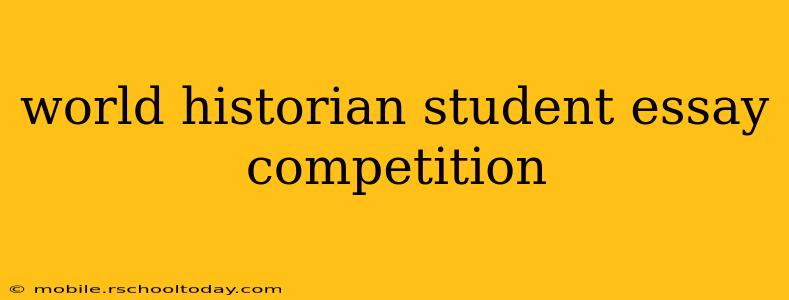For aspiring world historians, the opportunity to participate in an essay competition offers a chance to showcase research skills, analytical abilities, and passion for the subject. This guide provides insights into navigating these competitions, from selecting a compelling topic to crafting a winning essay.
Choosing the Right Topic: The Foundation of a Strong Essay
The first hurdle, and often the most daunting, is selecting a suitable topic. Avoid overly broad subjects; instead, focus on a specific historical event, period, or theme that allows for in-depth analysis within the word limit. Consider your personal interests within world history – what aspects genuinely excite you? This enthusiasm will translate into a more engaging and compelling essay.
What are some good topics for a world history essay?
This question often arises during the essay selection process. A successful topic should be manageable in scope, allowing for detailed analysis within the specified word count. Examples of suitable topics include:
-
The impact of a specific technological innovation on a particular society or region: The printing press and the Reformation, the compass and Age of Exploration are just two examples. The key is to narrow your focus – don't attempt to discuss all impacts of the printing press globally.
-
A comparative study of two historical figures: Comparing leadership styles, motivations, and legacies of figures from different regions and time periods can be very insightful. For example, comparing Genghis Khan and Alexander the Great or comparing the leadership of Otto von Bismarck and Giuseppe Garibaldi.
-
The analysis of a single historical event with lasting consequences: The assassination of Archduke Franz Ferdinand, the fall of the Berlin Wall, or the impact of the Black Death are all viable options, allowing detailed examination of causes, consequences, and long-term effects.
-
Exploring a specific historical theme across different cultures: This allows a broad sweep, but necessitates a tight focus. Consider themes like the development of empires, the role of religion in shaping society, or the impact of trade routes on global interconnectedness.
Conducting Thorough Research: The Cornerstone of Credibility
Once a topic is chosen, thorough research is paramount. This involves utilizing primary and secondary sources to build a comprehensive understanding.
What are primary and secondary sources, and how do I find them?
Primary sources are materials created during the historical period being studied. Examples include letters, diaries, official documents, speeches, and artifacts. Libraries, archives, and online databases (like JSTOR and Project MUSE) are excellent resources.
Secondary sources are interpretations and analyses of historical events written by historians. Books, journal articles, and scholarly websites are examples. These provide crucial context and different perspectives on your topic.
Remember to critically evaluate your sources – consider the author's biases, perspectives, and the credibility of the information presented. Proper citation is crucial, both to avoid plagiarism and to demonstrate the depth of your research.
Crafting a Compelling Narrative: Engaging the Reader
Your essay is more than a collection of facts; it's a narrative. Structure your argument logically, with a clear introduction outlining your thesis statement, supporting paragraphs providing evidence and analysis, and a conclusion summarizing your findings and offering final reflections.
How do I write a strong thesis statement?
A strong thesis statement clearly articulates your central argument. It should be concise, specific, and arguable. It's the roadmap guiding your essay, providing a clear direction for both you and your reader.
Polishing Your Essay: The Final Touches
Before submission, revise and edit meticulously. Check for grammatical errors, clarity of expression, and logical flow. Seek feedback from teachers, mentors, or peers to gain valuable insights and improve your essay.
Conclusion: Striving for Excellence
Participating in a world history essay competition is a challenging yet rewarding experience. By selecting a compelling topic, conducting rigorous research, crafting a well-structured narrative, and polishing your work, you significantly enhance your chances of success. Remember, the journey of writing the essay is as important as the final product. Embrace the learning process, enjoy the research, and allow your passion for world history to shine through in your writing.
